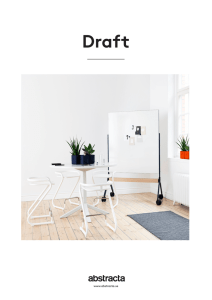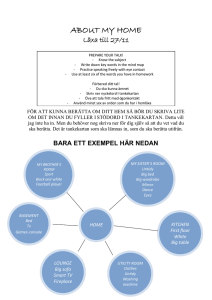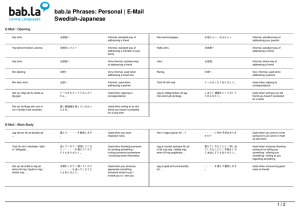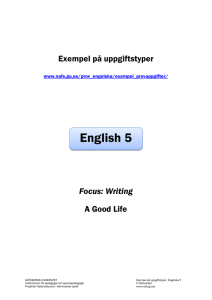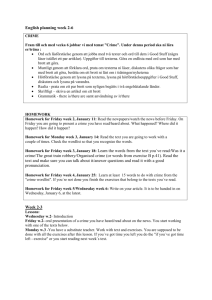Writing - WordPress.com
advertisement
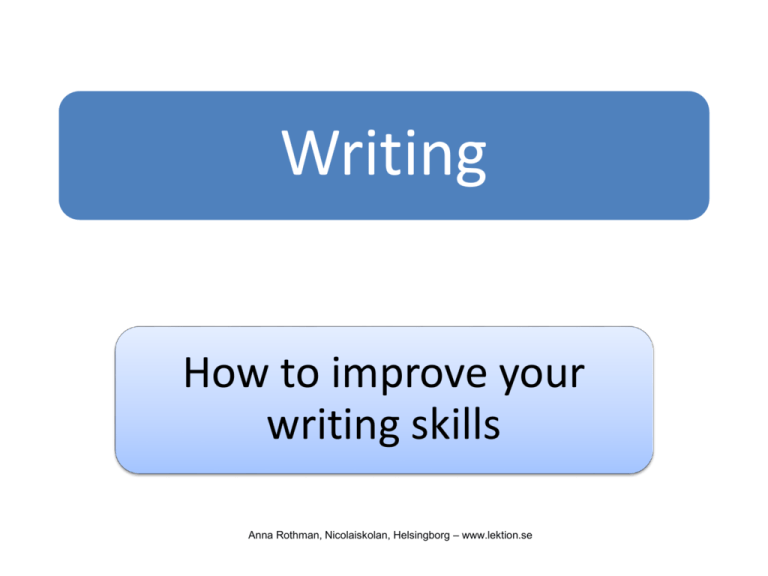
Writing How to improve your writing skills Anna Rothman, Nicolaiskolan, Helsingborg – www.lektion.se Why do we write? To communicate with friends (informal writing) To communicate formally, e.g. with a company To make our opinions known in a newspaper (letter to the editor) To leave messages (note) To tell a story To keep a personal account of events (a diary, blog etc.) To sell or publices something in a newspaper (an advert) To show how to do something (instructions) To put words to music (lyrics) To present facts or opinions (essay) Source: http://www.flickr.com/photos/jbleith/3803599149/ What kind of writing do you use the most? What is important to think about when it comes to informal writing? What is important to think about when it comes to formal writing? No matter what kind of text you are going to write you are expected to use appropriate language for that king of text. Let’s look into this further. Informal writing Everyday language Short sentences Slang and colloquialism may be accepted Use contractions (isn’t, I’d, we’re etc.) and abbreviations (asap) Be personal Use verbs in the active form Use informal language both when starting and ending a letter or an e-mail (Hi Karen, Love Tim) The message must come through immediately Formal writing Use a clear structure and divide your text into paragraphs Use linking words Use a varied vocabulary, with complete and varied sentences Use full forms of words (I have, we are, I would, as soon as possible etc. Use formal words (instead of using deep use profound for instance) Be formal and polite Always use formal greetings and expressions to end a letter or an e-mail (Dear Mrs. Green, Sincerely yours) Why is it important to write well? Something you write becomes a part of yourself – Learning and processing new knowledge develop your brain capacity. Writing increases your vocabulary – Really knowing a word means being able to use it in the correct context. (Passive vs. Active vocabulary) Writing improves your grammar. Writing helps you practise your spelling – Always use a dictionary when you have the chance!!! – Why is spelling important? Find out here! Spelling – Why bother? • Spelling is important so that a reader can process the communication as quickly and easily as possible. • What happens if you don’t spell correctly? Eye halve a spelling chequer It came with my pea sea • Have a look at the “spell chequer” here -> It plainly marques four my Does it make sense? *Source unknown revue Miss steaks eye kin knot sea. Eye strike a key and type a word And weight four it two say Weather eye am wrong oar write It shows me strait a weigh. As soon as a mist ache is maid It nose bee fore two long And eye can put the error rite Its rare lea ever wrong. Eye have run this poem threw it I am shore your pleased two no Its letter perfect awl the weigh My chequer tolled me sew How to come up with ideas for writing • A common argument from students is ”I don’t know what to write – I have no imagination” Tips! Look around yourself – what in your immediate field of vision can trigger your imagination? Can you think of related things that have happened recently to yourself or anyone you know of? Is the given topic something that does not interest you in any way? Why? Make a mindmap with ideas. Paella Gazpacho Tortilla española Flamenco Real Madrid Food Football SPAIN ESPEE Warm climate Siesta Sangría Barça Linking words • Linking words are words you use to connect sentences or parts of sentences. By using linking words you express yourself more clearly and the reader finds it easier to understand your ideas. The more formal the text is the more linking words are required. • Here is a list of useful linking words you can use: Group 1 – Result linkers (”so”) Therefore That is why For this/that reason Consequently hence Group 2 – Reason/Cause linkers (”because”, ”as”) Since As a result of* In view of* Because of* Due to* Owing to* Thanks to* * Must be followed by a noun, a pronoun or an ”ing-form” verb. Group 3 – Concessive linkers (”but”) Though Even though Although While Whilst Wheras Yet In spite of* Despite* Group 4 – Other linkers* Above all On the whole Nevertheless However In fact Still/even so Otherwise On the one hand On the other hand At the same time Moreover What is more In addition Besides Apart from Hardly * These are just a few examples of linking words. Ask your teacher for more! *These linkers should be followed by a comma if they come at the beginning of a statement. Sometimes if they come in the middle of a sentence, we put commas both before and after. • Tip! Do not confuse: What’s more, moreover and in addition with Besides • What’s more, moreover and in addition add extra information. Example: I reckon this is the car I should buy as it’s cheap enough and not really so old. What’s more, it’s just been re-sprayed. • Besides adds another argument that is shown as being stronger than the other ones mentioned. Example: I reckon this is the car i should buy as it’s not so old, and it’s just been resprayed. Besides, it’s the only one I can afford. • Note that besides can also be used as a preposition, in which case it must take an ing-form verb. Example: Besides having the right price, what attracted me to the car was its new re-spray. Try to learn as many linking words as possible! Use them in writing as well as speaking. This will help you improve your English instantly. The more you force yourself to write academically with advanced language, the more natural it will come to you and in the end you will not even think about it! Have a look at the following two sentences: She felt weak after her illness, but she turned up for the exam and managed to pass. She felt weak after her illness; nevertheless, she turned up for the exam and managed to pass. Which one looks more professional to you? WORKSHOP Write a story about anything. Use one of the phrases below to start off your text. Try to use as many linking words as possible. In a normal situation you might not use as many in one place, but this is for practicing, so that you get used to using them. The day I found… used to say… My great grandfather always When she opened the refrigerator… finally… After three years of searching ge Source: http://www.flickr.com/photos/tomgauld/3397589927/ (Tom Gauld) How to organize your text Depending on what kind of text you write, there are different guidelines to follow. But here are some basic rules that you are to follow in amost every case: Title – Doesn’t have to be a full sentence. Introduction – What is the main purpose of the text? Divide the text into paragraphs – Each new paragraph deals with a new idea. Summarise/Conclude the text before ending it . What do we assess? Contents - depth Imagination – Variation Idiomatic expressions Linking words Spelling Grammar Sentence structure – Basic vs. Use of subclauses etc. Focus: Writing English A Mål och bedömningskriterier enligt Kursplan 2000 Mål att sträva mot Skolan skall i sin undervisning i engelska sträva efter att eleven • utvecklar sin förmåga att kommunicera och • interagera på engelska i skiftande • sammanhang kring varierande frågor och i • olika situationer • förfinar sin förmåga att uttrycka sig i skrift • i olika sammanhang samt utvecklar sin • språkliga medvetenhet och kreativitet • utvecklar sin förmåga att analysera och • bearbeta språket mot allt större tydlighet, • variation och formell säkerhet Betygskriterier Mål som eleverna skall ha uppnått efter avslutad kurs Mycket väl godkänd • Eleven skriver med sammanhang och variation, • använder språkets ord och strukturer med säkerhet • samt kommunicerar skriftligt med anpassning • till olika mottagare Eleven skall • kunna formulera sig i skrift för att • informera, instruera, argumentera och • uttrycka känslor och värderingar samt ha • förmåga att bearbeta och förbättra den egna • skriftliga produktionen Godkänd • Eleven skriver med klart och tydligt språk, såväl • personligt hållna meddelanden, berättelser och • reflexioner som sammanfattningar som har att • göra med egna intressen och egen studieinriktning Väl godkänd • Eleven skriver brev, kommentarer och sammanfattningar • till inhämtat stoff på ett tydligt och • informativt sätt och med anpassning till några • olika syften och mottagare. Bedömningsfaktorer vid skriftlig produktion Följande faktorer är avsedda att vara till hjälp vid bedömningen. • Vilja och förmåga att använda språket i skrift för att uttrycka ett innehåll • Innehåll - idérikedom/fyllighet anpassning till ämne och innehåll sammanhang, struktur och klarhet • Språk - flyt och ledighet strategisk kompetens (förmåga att komma runt svårigheter) och flexibilitet vokabulär, idiomatik och fraseologi (bredd och variation) grammatisk kompetens meningsbyggnad stavning Summary - Conclusion Practise your writing a lot so that you improve your writing. Try to use the tips in this lecture. This will force you to think a lot more about the way you write. Have patience and remember that writing is a process. It takes time and you need to put an effort into it! A text is never finished . It can always be polished and revised so that the reader gets more out of it and remember… …it is not quantity that matters – it is quality! Have fun while practising your writing skills Useful links • • • RMIT University, http://www.dlsweb.rmit.edu.au/lsu/content/4_WritingSkills/00writingskills.ht m (A great page with lots of tips!) http://www.dailywritingtips.com/ http://www.meredithsuewillis.com/writingexercises.html List of references Core English 2 (2009) Gustafsson, J., Hjorth, M., Kinrade, E., Bonnier Utbildning AB, Stockholm English your way – Student’s Manual, (1996) Aldeborn, E. & Ågren L., Ekelunds Förlag AB, Solna Revving up writing (2002) Persson, L., Liber AB, Stockholm Pictures are taken from www.flickr.com and licensed through Creative Commons Photography is private. (Anna Rothman) Anna Rothman, Nicolaiskolan, Helsingborg – www.lektion.se
